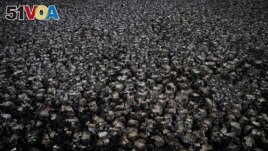11 November 2022
In southwestern Spain, close to the Atlantic Ocean, the Donana National Park is known as the nation's "crown jewel."
It is a protected wetlands area home to many animals, including birds such as flamingos and herons.
Now, after a summer of record-high temperatures and little rain, the wetlands are dry, brown and smelly.

Cracks in the mud are visible in a dry wetland in Donana natural park, southwest Spain, Wednesday, Oct. 19, 2022. Farming and tourism had already drained the aquifer. Then climate change hit Spain with record-high temperatures and a prolonged drought. (AP Photo/Bernat Armangue)
Most fish and birds are gone, as well.
Bodies of water called lagoons are at the heart of the park. Most dry up and refill throughout the year. Santa Olalla is the park's biggest lagoon. It traditionally has water year round. In the summer, it provides water to needy plants and animals.
But this year, Santa Olalla dried up.
Carmen Diaz is a biologist who studies the park. She showed a reporter from the Associated Press around and stepped into a muddy area with a little bit of water.
"Seeing this last bit of water makes me think that the entire park is dry," she said.
The park has been home to hundreds of thousands of birds that visit for the winter. Many others use it as a stopping place during migration from Africa to northern Europe. Five kinds of threatened birds, including the Spanish imperial eagle, live in Donana. There is also a breeding and rescue center there for the endangered Iberian lynx, an endangered kind of wild cat.
Diaz is a government researcher with the Spanish National Research Council. She said the time to save the park was 20 years ago, but, in her words "nothing was done."
"The environment always loses against the economy," she said.
The park is where the Guadalqivir River meets the ocean. The area was once along an important shipping route for Spanish explorers who sent silver back from the colonies in central and South America. Because of the plant and animal life, scientists and conservationists have studied the area for many years.
Carlos Davila is among them. His research centers on the imperial eagle. He said 2022 was a "disastrous year" for the birds. Only two babies were born from a group of eight mating pairs.
When rain comes, the area comes back to life. However, city development along the Atlantic coast and farms in other areas are putting pressure on the wetlands. Conservationists protest about the nearby city of Matalascanas, for example. Once a quiet fishing village, the town now is a popular center for beach vacations.
But scientists and environmentalists say that the town requires too much water from Donana. And, the European Court of Justice ruled that the city is making some of the park's lagoons go dry.
Farther away, in the area called Huelva, traditional Spanish olive crops have been replaced by berry farms. The berries bring in more money than olives, but they require more water to grow. The World Wildlife Fund says there are thousands of wells in the area taking ground water without permission. This means the water never makes it into the wetlands.
Felipe Fuentelsaz is an agriculture expert with the World Wildlife Fund in Spain. He says Donana National Park has a big problem from the severely dry weather. But he said the park is also suffering from poor supervision. That permitted the building of illegal wells and other activity to redirect water resources.
While the government is working to close some of the wells, farmers are pushing back. They say they have always had the right to use water in the area and they are only taking what is theirs.
Spain's government is considering projects that would send some water from rivers in other parts of the country to help bring life back to Donana.
I'm Dan Friedell.
Dan Friedell adapted this story for VOA Learning English based on a report by the Associated Press.
__________________________________________________________________
Words in This Story
breed –v. to produce young animals